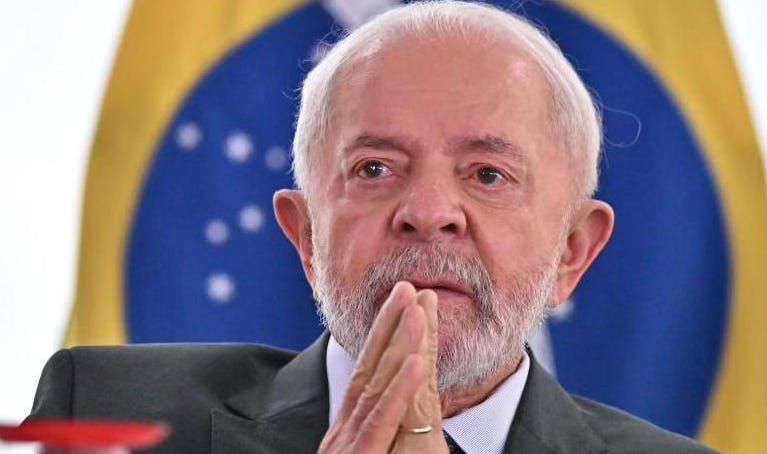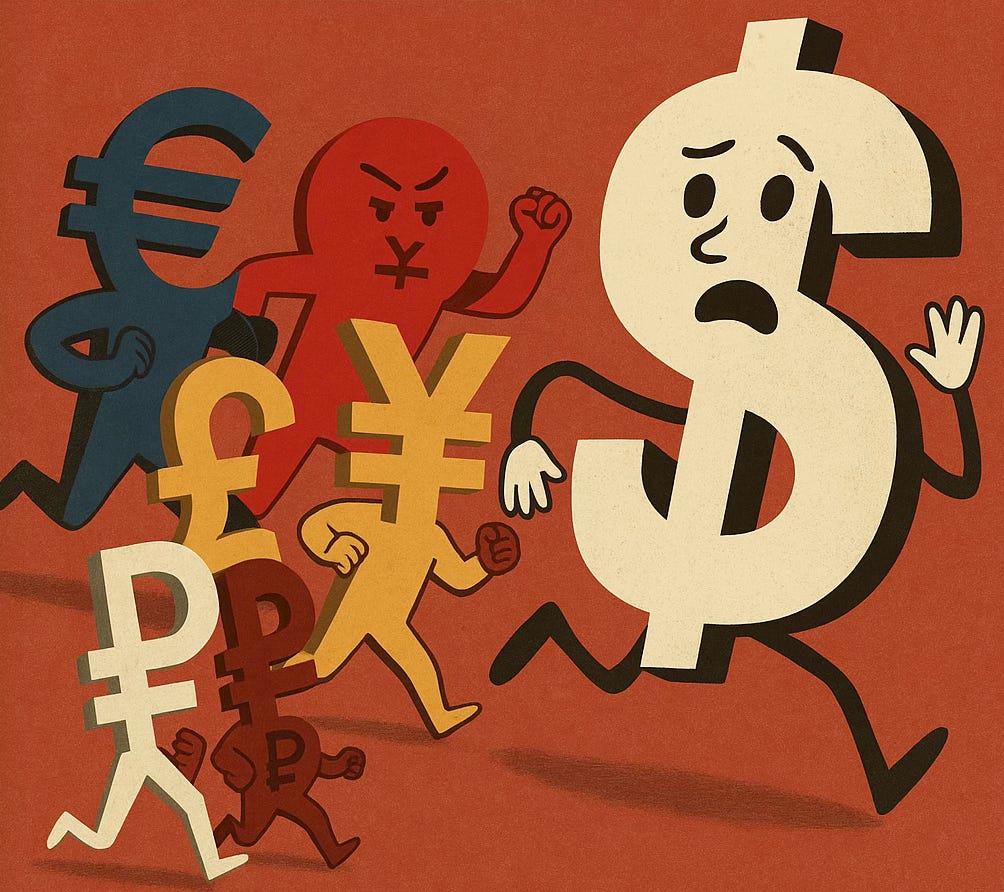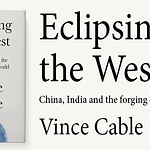Hello and welcome back to States of Play with me Sam Olsen, the podcast about the changing world order.
In my introduction to States of Play last time, I spoke about what a world order actually is and who gets to decide it. Two of the most important elements are power and legitimacy. And there isn't much more to power than having the most important economy and the most important currency.
It's fair and accurate to say that the US dollar is the most powerful currency in the world based on its global dominance in trade, finance and reserves. But why is it considered so powerful? First, it is the global reserve currency. Over 58 % of global foreign exchange reserves are held in US dollars. The central banks around the world stockpile dollars to stabilize their own economies. Second, it's the primary trade currency. Most international trade, especially in oil, commodities and global goods, is priced and transacted in dollars.
In sum, is the financial system's backbone. But it hasn't always been the US dollar. It used to be the British pound, as it had been since the end of the Napoleonic Wars in 1815. The first major blow to that position was World War I. The war massively strained Britain's finances, forced it off the gold standard and led to large debts, especially to the United States.
The pound began to lose ground to the US dollar, but it remained important if not dominant. There was a brief recovery attempt under Winston Churchill in the late 1920s with the so-called return to gold, when Britain returned to the gold standard, but it was set at the wrong rate, which overvalued the pound and hurt British exports and growth. Britain abandoned the gold standard again in 1931, which further weakened the pound's prestige.
The final nail in the coffin of the Pound's position as reserve currency was the Second World War when Britain's economy was further damaged and it became financially dependent on the US through programs like Lend Lease. The US dollar formally became the world currency with the Bretton Woods Agreement in 1944 when it was institutionalised as the world reserve currency, backed by gold.
The Pound became a secondary reserve currency, still widely held but then declining in influence. The post-war period saw the final dismissal of the pound as a reserve currency when it faced periodic devaluations notably in the late 1940s and in 1967 and continued capital flight from the UK. Then in 1976 the IMF crisis forced Britain to borrow nearly four billion dollars further eroding confidence in the pound.
All this means that today, the pound is no longer the world's reserve currency. The question is, are we seeing a similar trend with the dollar? Many countries want to avoid using the dollar. President Lula of Brazil, for example, said that “every night I go to bed wondering how I can stop Brazil from using the dollar”.
Foreign Minister Lavrov of Russia, not always the most reliable of sources, is also a particular proponent of no longer using the dollar, especially for international trade. We call this de-dollarization. To investigate the potential for de-dollarization, I'm joined today by Meyrick Chapman.
Meyrick has long been my principal go-to on anything to do with macroeconomics. He has extensive experience in investment in macro portfolio management and is the principal founder of Hedge Analytics, providing hedging and quantitative trading models to professional investors. He also serves as a visiting lecturer at the University of Buckingham. Previously, he was a portfolio management at Elliott Management, a major global investment firm, and he's the author of Don't Be Fooled Again, a macroeconomic assessment of the global financial crisis. Welcome. Nice to see you again.
Meyrick (04:19)
Yeah, thanks very much for welcoming me. Thank you, Sam.
Sam Olsen (04:23)
So start things off, and notwithstanding the two minute history I just gave, why is the dollar the reserve currency?
Meyrick (04:32)
Convenience is a very sensible answer. I think people use complicated terms like network effects, but that really encapsulates convenience for all the parties involved. Convenience and safety, I think that's the two most important characteristics. It's easy to transact in dollars, even if whether you're in the United States or not. And there's a degree of both legal and social safety and political safety in doing so. So I think that's really the basis of its power. There's slightly more to it than that, of course.
I mean, one of the myths that opponents of dollar hegemony often give is that somehow there's some conspiracy by US government officials to implement dollar hegemony around the world, and that therefore it's some kind of almost CIA plot to undermine local sovereignty. Whereas in fact, the way that the dollar
became the dominant currency is anything but a conspiracy. was simply individual traders who decided that they would prefer to be paid in dollars, especially after the Second World War, rather than in pounds or very devalued Deutschmarks or Reichsmarks and French francs.
So, you know, there's an element of free enterprise in determining which is the reserve currency. It's the currency that traders prefer to deal in and prefer to be invoiced in.
Sam Olsen (06:39)
Okay, so but on that, why would the dollar be more attractive? mean, was it that people, traders, for example, were worried that there would be devaluation, so therefore if they bought goods in pounds now, the pound might devalue, therefore losing their money in the short, longer term, is that the reason why people started moving to the dollar?
Meyrick (07:01)
Well, I think you pointed to two seminal wars, perhaps the biggest wars in history, that led to the erosion of pound sterling as the dominant reserve currency. And that was the First World War and Second World War, so both of which left large parts of European political, economic, and in fact, social fabrics in tatters.
Whereas in both cases, America was left more or less intact, and in fact, very greatly strengthened in both cases economically. I think that's really the answer. There were two big steps up because the incumbents had more or less destroyed themselves. And the dollar was the obvious replacement.
Sam Olsen (07:56)
Obvious from a psychological point of view and a value point of view.
Meyrick (08:00)
Yes, I mean, as you alluded to in your introduction, the pound had a number of crises after the Second World War. In fact, it had a number of crises from really from the beginning of the 20th century, those became more prevalent and more pronounced after the First World War and then particularly after the Second World War. So it's hard to have to continue, as you said, as you said in the intro.
It's hard to maintain a reserve currency status of any note when you have repeated financial stability problems in that currency. think it's also maybe a good time to introduce the notion of key currencies, which as far as I'm concerned is another way of describing network effects of currencies like the dollar.
There are only a limited amount of key currencies that you can have in the world that will be of any note. if you look at in your introduction, you mentioned the reserve balances held by central banks and quoted the figure of 58 % held in dollars. And then there'll be something like 6%, I think, in yen, 3 % in sterling and euro would be something around 20% or something like that. We're talking there about five or six currencies. There are a few others. But generally speaking, reserve currencies, i.e. currencies that are held by central bank reserves, are a very limited set. And it's very highly skewed towards one, namely the dollar.
And why is that skewed towards one? Well, because there is this tendency always in any kind of unified economic unit to gravitate towards a recognized standard. And that's the key currency. And the key currency happens to be the dollar. It's not just happenstance. It's also because it's bolstered by a certain obvious legal standard that pertains in US courts with regard to contract. And that doesn't happen, for instance, in China. You can't rely on Chinese courts to give you an appropriate judgment. And it is also economic. And both the economic and the political and the judicial or legislative or whatever, however you want to frame it, they all go together.
It's one unitary system that helps support the reserve status of the dollar.
Sam Olsen (11:06)
That's why the US dollar is the primary currency. But why would America want to have the primary currency? What is in it for America?
Meyrick (13:06)
Well, it certainly gives some Americans a great deal of benefit. So the financial system of America is both the most liquid and continues to be the most liquid because the dollar is the major international currency. So the US financial system is without doubt the dominant financial system in the world because it extends not just domestically, which is a very large domestic financial centre, but it's also an international financial centre. So yes, in that sense, it gives financiers in the US access to capital that those in other currencies do not have.
But in terms of other members of American society, it's not at all obvious that having the dominant currency is a great benefit. if you have a system which really shows that the rest of the world wants to own your assets, then that is not necessarily always good for domestic audience, the domestic population.
It depends on where you stand. There are benefits. They're not unpolluted by drawbacks.
Sam Olsen (14:41)
Because your substack, time for a quick plug, is called exorbitant privilege and that's all about the benefits that are given to America by having the reserve currency. But in recent times there's been a lot of people saying that they actually don't think that having the reserve currency is good for America. And in fact there are people within the Trump administration who have said that this is something that they should perhaps reconsider if they want to make America great again.
Can you just talk, why is that? I mean, it makes no sense from a lay person's point of view, considering all the benefits they have got from having the dollar, that they would want to get rid of this. Maybe I'm missing something.
Meyrick (15:26)
Well, think to summarize one of the main arguments against continuation of the dollar as a reserve currency from an American perspective is the notion that it has created a demand for dollars, which has pushed up the cost of the dollar overall and therefore made manufacturing in particular uncompetitive relative to other parts of the world, namely China. I think there's an element of truth in that. There's also the other side, which is that China has deliberately maintained an undervalued currency relative to the US as a means of bolstering its exports and dominating large sections of industry around the world. There are probably two sides of the same coin, but that's, I think, the principal argument of those within the Trump administration and allies of it who argue that it hasn't been all plain sailing as far as reserve currency status is concerned.
Sam Olsen (16:45)
But where would where would getting rid of the dollar as reserve currency leave, for example, American tech companies? Because I know that there's a there's a theory out there that American tech has been bolstered by the by having the reserve currency. Maybe you could talk that through. Why is it that America has a benefit for its technology industry from the dollar?
Meyrick (17:13)
Well, I think there are several strands. One of the principal arguments about the difficulties of having a reserve currency is that it has led to both current account deficits and trade deficits. And those are deemed to be bad. That effectively, the US is being subject to unfair trade practices by the rest of the world because there isn't a balance between the US and the rest of the world.
But what that fails to take account of is that the US is exporting intellectual property, it's exporting its assets to foreigners, and in return for those exports, it has to have something against that in terms of the balance. And the balance of its exports of financial assets, which then of course become liabilities to the US, is the trade deficit. So in a sense, as long as you've got foreigners who want to acquire US assets, they are going to run a current account or a trade deficit.
Sam Olsen (18:42)
Okay, does in effect, does having the dollar mean that it's easier for America to pay for its innovation?
Meyrick (18:50)
I realize now that I actually didn't ask you to answer your question because you're so it and I guess that's a gentle nudge towards trying to answer the question. But yes, I mean, if you have if you look at where if there's a great deal of focus on trade deficits and on current account deficits, if instead you look at the US in terms of total balance sheet and who owns the light, who owns the assets or who where the balance sheet of the United States is divvied up around the world. What you find is that more and more of the US is owned by foreigners. So the net international investment position of the United States has gone from mildly negative around about 20% of GDP, say 20 years ago, to something like 88 % of GDP now. So it's massively negative.
But if you look at how that has occurred, it has occurred because the value of equities in particular in the United States has gone up significantly relative to anywhere else in the world. And what are those equities associated with? Well, it's the magnificent seven in the last five years or seven years. Those huge tech companies that dominate the world really, and they are all American. so the equity markets and the intellectual property associated with those companies is American. And so you can say that the rise in the international, the net international investment position has got larger, the liabilities to foreign has got larger because of the success of these tech companies. Or you can turn that around and you can say that the cumulative trade deficits have in some, through a process of intermediation, they've ended up as equity and technological success in the US.
The one thing that's worth bearing in mind here is that there's almost only one destination in which you can monetize intellectual property successfully as an entrepreneur in the world. And there are small markets which are favourable, but there's one in particular nobody can ignore, which is if you've got a good idea, everybody wants to sell that good idea in America because that's the way in which leads to IPOs, it leads to real monetary gains and nowhere else could really compete with that.
Sam Olsen (21:55)
But what percentage amount of that reality is based on America having the reserve currency?
Meyrick (22:05)
Well, think, again, I think you would probably turn it around and say that the reserve currency status is a factor of this attraction of investors and assets, intellectual property, legal rights, et cetera. I mean, some of which are being challenged.
So what used to be known as the Washington Consensus, which was effectively an attempt to spread American values around the world, that is being challenged both internally as well as externally. So, and in particular, I'm thinking of the sanctions that have been imposed on Russia subsequent to Ukraine is an actual challenge to the legal legitimacy of the dollar from certain angles.
Of course, you can also say that it's an assertion of legal values from America, but there's a contract that's at least a big area of debate about what sanctions are doing to the dollar. And they're certainly not helping its attractiveness to Russians.
Sam Olsen (23:28)
Okay, so before we get on to that, because that's a really interesting point about the use of dollars in sanctions. But just sticking on to the benefits of America, it's very interesting what you said there, which is basically that the reason America's currencies is a reserve currency is because the fundamentals behind it are so attractive, which is the law courts and the rule of law and economic growth and the flow of capital and the ability to use all that to help create growth, like innovation, etc.
So those are really sort fundamental benefits for America, which lead into the dollar's primacy. But another thing is obviously is the ability to then use that as a power of international, to an international effect.
And you mentioned there about the international financial system. There was that great book, Underground Empire, which was written a few years ago about the US is in control literally of the fibres around the world, which allow dollars to flow around it. For example, the SWIFT network, which many people would have heard of. Control of that gives America an effective control of who is in and who is out of the global financial system, right?
So surely having the dollar as the observed currency is the underpinning of that control over the world's financial networks?
Meyrick (25:03)
Yes, it certainly is. My argument isn't that the reserve currency status is irrelevant to or doesn't matter. What my argument is, it's really a symbiotic attraction. Private investors are attracted to it. It is not imposed by government. Government can certainly make use of the attractions that investors and private individuals and corporations find in the dollar.
And they do, because that's a political imperative. If you've got a way to use power, you're going to find ways to deploy that power. And especially if the dollar is now absolutely embedded into the financial plumbing of the entire world in every country, then that gives you enormous political leverage through the way that the corresponding banking system works, the way the payment system works, as well as the actual institutions that agree on international financial regulations, that adjudicate sovereign restructurings and so on, namely the IMF and the World Bank, and all those institutions which are kind of the children of the original Bretton Woods Agreement.
Sam Olsen (26:31)
So if you're sitting there in Iran or Russia and you've been kicked out of the SWIFT system and you haven't got any access to official financial backbone of the world, then you're obviously not going to be a big fan of the dollar being the global currency in America having the global financial power that it does. So the question is, to what degree can they use other currencies and this is before we get onto the whole conversation on if there can be another global currency; but is does not being part of the dollar system really make it difficult for these countries to trade internationally or is it slightly overhyped?

Meyrick (27:16)
Trade is whatever both sides will accept. Trade doesn't stop because you're no longer trading in dollars. It might change the price. For those who want to engage in international trade and whilst excluded from the dollar system, it's very clear that Russia, for instance, selling energy products outside the dollar system through clandestine fleets of oil tankers and also at a discount. There is a cost to being outside, but it doesn't stop trade.
Russia has been largely excluded from international trade in its oil products and energy products, but that hasn't stopped the trade in energy products. It's simply introduced a discount to those products. So anybody who deals with Russia can insist that the payment is slightly cheaper than the world price.
Sam Olsen (28:35)
Which apparently is what China has been benefiting from. The word on the street is that China have signed very, very competitive contracts with Russia for the oil and the gas, which aren't necessarily in Russia's favour, which makes one think that actually the sanctions on Russia from the Ukraine war would be quite beneficial to China. But that doesn't stop China wanting to replace the dollar.
So why though, why would China want to undermine the dollar as the global currency?
Listen to this episode with a 7-day free trial
Subscribe to States of Play by Sam Olsen to listen to this post and get 7 days of free access to the full post archives.














